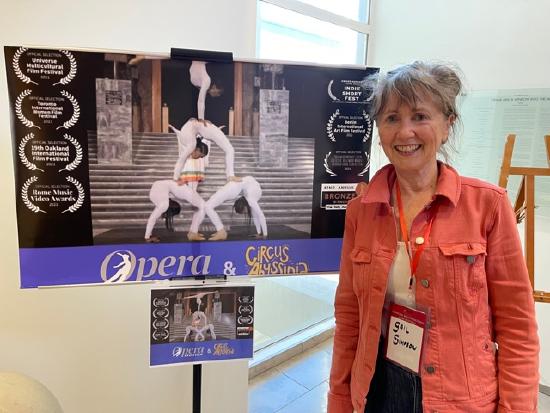5.6: Film Festivals
- Page ID
- 123418
\( \newcommand{\vecs}[1]{\overset { \scriptstyle \rightharpoonup} {\mathbf{#1}} } \)
\( \newcommand{\vecd}[1]{\overset{-\!-\!\rightharpoonup}{\vphantom{a}\smash {#1}}} \)
\( \newcommand{\id}{\mathrm{id}}\) \( \newcommand{\Span}{\mathrm{span}}\)
( \newcommand{\kernel}{\mathrm{null}\,}\) \( \newcommand{\range}{\mathrm{range}\,}\)
\( \newcommand{\RealPart}{\mathrm{Re}}\) \( \newcommand{\ImaginaryPart}{\mathrm{Im}}\)
\( \newcommand{\Argument}{\mathrm{Arg}}\) \( \newcommand{\norm}[1]{\| #1 \|}\)
\( \newcommand{\inner}[2]{\langle #1, #2 \rangle}\)
\( \newcommand{\Span}{\mathrm{span}}\)
\( \newcommand{\id}{\mathrm{id}}\)
\( \newcommand{\Span}{\mathrm{span}}\)
\( \newcommand{\kernel}{\mathrm{null}\,}\)
\( \newcommand{\range}{\mathrm{range}\,}\)
\( \newcommand{\RealPart}{\mathrm{Re}}\)
\( \newcommand{\ImaginaryPart}{\mathrm{Im}}\)
\( \newcommand{\Argument}{\mathrm{Arg}}\)
\( \newcommand{\norm}[1]{\| #1 \|}\)
\( \newcommand{\inner}[2]{\langle #1, #2 \rangle}\)
\( \newcommand{\Span}{\mathrm{span}}\) \( \newcommand{\AA}{\unicode[.8,0]{x212B}}\)
\( \newcommand{\vectorA}[1]{\vec{#1}} % arrow\)
\( \newcommand{\vectorAt}[1]{\vec{\text{#1}}} % arrow\)
\( \newcommand{\vectorB}[1]{\overset { \scriptstyle \rightharpoonup} {\mathbf{#1}} } \)
\( \newcommand{\vectorC}[1]{\textbf{#1}} \)
\( \newcommand{\vectorD}[1]{\overrightarrow{#1}} \)
\( \newcommand{\vectorDt}[1]{\overrightarrow{\text{#1}}} \)
\( \newcommand{\vectE}[1]{\overset{-\!-\!\rightharpoonup}{\vphantom{a}\smash{\mathbf {#1}}}} \)
\( \newcommand{\vecs}[1]{\overset { \scriptstyle \rightharpoonup} {\mathbf{#1}} } \)
\( \newcommand{\vecd}[1]{\overset{-\!-\!\rightharpoonup}{\vphantom{a}\smash {#1}}} \)
\(\newcommand{\avec}{\mathbf a}\) \(\newcommand{\bvec}{\mathbf b}\) \(\newcommand{\cvec}{\mathbf c}\) \(\newcommand{\dvec}{\mathbf d}\) \(\newcommand{\dtil}{\widetilde{\mathbf d}}\) \(\newcommand{\evec}{\mathbf e}\) \(\newcommand{\fvec}{\mathbf f}\) \(\newcommand{\nvec}{\mathbf n}\) \(\newcommand{\pvec}{\mathbf p}\) \(\newcommand{\qvec}{\mathbf q}\) \(\newcommand{\svec}{\mathbf s}\) \(\newcommand{\tvec}{\mathbf t}\) \(\newcommand{\uvec}{\mathbf u}\) \(\newcommand{\vvec}{\mathbf v}\) \(\newcommand{\wvec}{\mathbf w}\) \(\newcommand{\xvec}{\mathbf x}\) \(\newcommand{\yvec}{\mathbf y}\) \(\newcommand{\zvec}{\mathbf z}\) \(\newcommand{\rvec}{\mathbf r}\) \(\newcommand{\mvec}{\mathbf m}\) \(\newcommand{\zerovec}{\mathbf 0}\) \(\newcommand{\onevec}{\mathbf 1}\) \(\newcommand{\real}{\mathbb R}\) \(\newcommand{\twovec}[2]{\left[\begin{array}{r}#1 \\ #2 \end{array}\right]}\) \(\newcommand{\ctwovec}[2]{\left[\begin{array}{c}#1 \\ #2 \end{array}\right]}\) \(\newcommand{\threevec}[3]{\left[\begin{array}{r}#1 \\ #2 \\ #3 \end{array}\right]}\) \(\newcommand{\cthreevec}[3]{\left[\begin{array}{c}#1 \\ #2 \\ #3 \end{array}\right]}\) \(\newcommand{\fourvec}[4]{\left[\begin{array}{r}#1 \\ #2 \\ #3 \\ #4 \end{array}\right]}\) \(\newcommand{\cfourvec}[4]{\left[\begin{array}{c}#1 \\ #2 \\ #3 \\ #4 \end{array}\right]}\) \(\newcommand{\fivevec}[5]{\left[\begin{array}{r}#1 \\ #2 \\ #3 \\ #4 \\ #5 \\ \end{array}\right]}\) \(\newcommand{\cfivevec}[5]{\left[\begin{array}{c}#1 \\ #2 \\ #3 \\ #4 \\ #5 \\ \end{array}\right]}\) \(\newcommand{\mattwo}[4]{\left[\begin{array}{rr}#1 \amp #2 \\ #3 \amp #4 \\ \end{array}\right]}\) \(\newcommand{\laspan}[1]{\text{Span}\{#1\}}\) \(\newcommand{\bcal}{\cal B}\) \(\newcommand{\ccal}{\cal C}\) \(\newcommand{\scal}{\cal S}\) \(\newcommand{\wcal}{\cal W}\) \(\newcommand{\ecal}{\cal E}\) \(\newcommand{\coords}[2]{\left\{#1\right\}_{#2}}\) \(\newcommand{\gray}[1]{\color{gray}{#1}}\) \(\newcommand{\lgray}[1]{\color{lightgray}{#1}}\) \(\newcommand{\rank}{\operatorname{rank}}\) \(\newcommand{\row}{\text{Row}}\) \(\newcommand{\col}{\text{Col}}\) \(\renewcommand{\row}{\text{Row}}\) \(\newcommand{\nul}{\text{Nul}}\) \(\newcommand{\var}{\text{Var}}\) \(\newcommand{\corr}{\text{corr}}\) \(\newcommand{\len}[1]{\left|#1\right|}\) \(\newcommand{\bbar}{\overline{\bvec}}\) \(\newcommand{\bhat}{\widehat{\bvec}}\) \(\newcommand{\bperp}{\bvec^\perp}\) \(\newcommand{\xhat}{\widehat{\xvec}}\) \(\newcommand{\vhat}{\widehat{\vvec}}\) \(\newcommand{\uhat}{\widehat{\uvec}}\) \(\newcommand{\what}{\widehat{\wvec}}\) \(\newcommand{\Sighat}{\widehat{\Sigma}}\) \(\newcommand{\lt}{<}\) \(\newcommand{\gt}{>}\) \(\newcommand{\amp}{&}\) \(\definecolor{fillinmathshade}{gray}{0.9}\)Finding Distribution
Film festivals match filmmakers to film distributors. If your film winds its way to a screening, it enters into an arena filled with distributors, filmmakers, and film enthusiasts, those people who may want to promote your film to a bigger world. This is where deals are made to find your audience. Similar to finding film grants, there are many pitfalls so the same caveats apply to finding reputable festivals like finding reputable grant foundations.
Finding an Audience
For the student filmmaker, finishing a film is a milestone. As a class assignment, there is a ready audience of fellow students watching your progress. You will eventually want a bigger world to enjoy your movie. Many students find it scary to place their film out for possible criticism. A filmmaker needs an audience to further learn their craft. Submitting to film festivals is a logical next step.
A film goes through multiple tiers of acceptance as it winds through a particular festival. At each level of acceptance, the film has a laurel attached to it. There are laurels for Semi Finalist, Finalist, Official Selections, and laurels for making it to the screenings. There are other awards at the screenings. The laurel recognitions are energizing to filmmakers who have only enjoyed an audience of their friends and family.

These laurels add up and help to advertise you film.

The Film Festival
Reputable festivals encourage filmmakers; that is their primary purpose. They connect audiences to unknown talent. Not every film submitted to festivals gets an actual screening in front of an audience. There are figurative gates they must pass through. Each gate a has title like: “Semi Finalist - "Finalist" - "Official Selective". The epitome of these gates is the one where your film is screened in front of an audience. In 2019, there were 14,000 films submitted to the Sundance Film Festival; only 100 were shown to an audience. Those selected films ran the gauntlet of screening levels to get to the final screening with a paid audience of film distributors and other film lovers.
Plan to attend the film festival you enter. Even if your film is not selected, filmmakers should travel to the screenings. Many showings have question and answer sessions, where one can meet and network about experiences.
The screenings are also where the deals are made for distributing the film to a wide audience. These relationships provide filmmakers with important contacts for future projects.
The Heat Check
Many filmmakers who get screenings find distributions for their films., A relationship forms and distributors will “heat check” these filmmakers. This means that they stay in contact with them and are interested in their newest projects. The heat check only works if filmmakers are well on their way working on another film. Since film development takes a long time, distributors are interested in films nearing completion. Once a distributor buys and circulates your film, they will be looking build future relationships.
Film Festival Checklist
If you are not antsy about when your film gets screened, try to enter the big film festivals first. Much of the bigger names like Sundance & Tribeca will only take films which have not premiered anywhere else first.
Once you have exhausted this first step, then look for a festival which matches the genre of your film. Just like with film grants, some festivals are specifically themed.
This is a small portion of just the documentary film festivals in the United States:
The 10 Under 10 Festival:
Showcases short, high-quality, low-budget documentaries.
AFI Docs:
An American international film festival created by the American Film Institute and the Discovery Channel.
The Big Sky Documentary Festival:
The festival presents an average of 150 non-fiction films annually at the historic Wilma Theater, The Top Hat, The Roxy Theater, and Crystal Theater in downtown Missoula, Montana.
Doc NYC:
the festival is the country's largest documentary film festival with over 300 films and events and 250 special guests.
· Doc LA – Los Angeles Documentary Film Festival:
While its primary focus is documentary and short films, DocLA selects and awards films of all genres.
Full Frame Documentary Film Festival:
The festival is a program of the Center for Documentary Studies at Duke University
United Nations Association Film Festival:
Every year the festival has a theme which emphasizes a particular topic including Education, Globalization, Health, Environment, Sustainability, Refugees, War and Peace.


